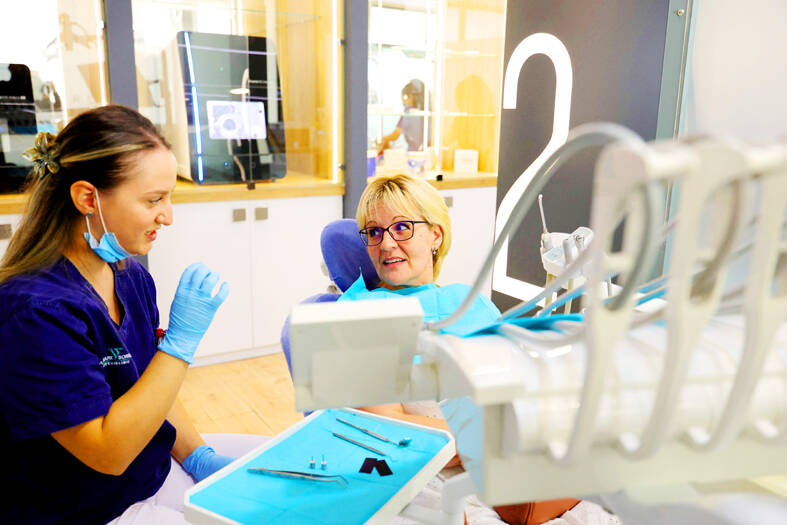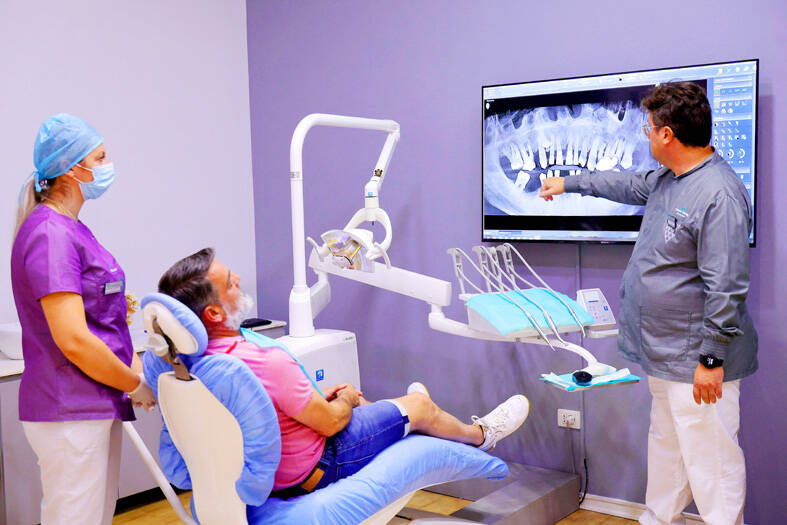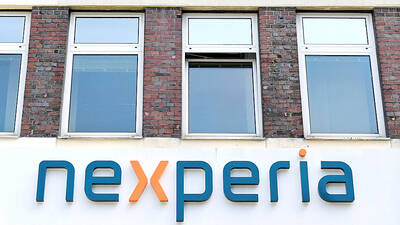Once it was Europe’s North Korea, a cloistered communist dictatorship. However, now Albania attracts millions of tourists a year, with a growing portion coming in search of a radiant smile, luscious lips or better breasts.
“I don’t like to talk about medical tourism. It’s a bit scary,” said Dritan Gremi, who heads a dental clinic in the capital, Tirana.
“I prefer to talk about happiness tourism, which makes people happy,” Gremi said.

Photo: AFP
His clinic offers “high-quality care with equipment that is guaranteed and certified” to European standards at a fraction of the price, Gremi said.
He has Italian, French, Belgian and Swiss clients often lured with package deals that include travel and accommodation costs.
With scandals about shoddy work and disfigured clients taking some of the shine off medical tourism elsewhere, Albanian health authorities say they insist on high-quality care.

Photo: AFP
Prosecutors carried out checks on 30 cosmetic clinics last month looking for contraband products and Botox, which is banned in Albania.
Stephane Pealat’s journey to Albania started with the hopes for a new, affordable smile. He and his brother, who are from Valence in the south of France, have long had dental problems, including tooth loss that pushed him to seek a complex dental implant procedure.
“In France we had an initial estimate which was very, very expensive. Then we started looking on the Internet — Bulgaria, Turkey, Albania, Spain,” Pealat said.
He learned about the Gremi clinic during a consultation session in Lyon, France, with Albanian dentists.
After an initial visit in August to tour the facilities in Tirana, Pealat and his brother returned in the autumn.
The dental implant operation he opted for cost about 50,000 euros (US$54,387) in France, compared with just 13,500 euros in Albania, Pealat said.
It was no small amount for Pealat.
“It is important to have a beautiful smile,” he said.
Nathalie Gangloff, who works as an event organizer at a nursing home in Cognac in western France, also opted for an Albania clinic to treat her dental issues.
“My doctor in France told me about a TV documentary” about medical tourism in Albania, Gangloff said.
She paid less than 15,000 euros to have her teeth done compared with the 42,000 euros that she would have had to spend in France. After extractions and implants in February, she returned to Tirana in mid-September for her final work, happy to have regained her smile.
“With my job, it’s important to have beautiful teeth and a good hairdo,” she said, adding that she immediately changed her Facebook profile picture to show off her new pearly whites.
Low overheads and tax have helped Albanian clinics attract customers with lower prices. The country’s medical tourism sector is estimated to earn 200 million to 250 million euros a year, with at least 50,000 Italians visiting Tirana for treatment every year.
However, the procedures are not risk free. Fatmir Ibrahimaj, head of Albania’s national doctors’ association, said foreign and local patients should not rely on online advertising alone for cosmetic procedures.
“A doctor is not a five-star or no-star hotel,” Ibrahimaj said.
For Anna Maria, an Italian from Milan, the “smile of the soul passes also through the lips.”
The psychologist in her 30s — who did not want to give her surname — visited Albania for dental veneers and a lip procedure with the hopes of improving her smile.
“More and more foreign tourists are also getting cosmetic treatments to brighten up their smile,” said Monika Fida, a dermatologist and university lecturer in Tirana.
Injections of hyaluronic acid into the lips are particularly popular.
“Above all, they want to feel good, and have well-shaped lips as naturally as possible,” added Fida, who said 750 to 1,000 foreign patients visit her clinic every year.
Vera Panaitov, a 60-year-old Italian chef from Verona, initially came to have her teeth done.
However, once in Tirana, she had opted for procedures on her breasts and waist.
“You have to be beautiful at any age and experience love and happiness at every moment,” she said, smiling from her hospital bed, saying she felt “happy and rejuvenated.”
French businesswoman Christine Cincunegui might soon follow her.
In Paris, she seemed set on going ahead with a dental procedure in Albania after consulting practitioners visiting the French capital.
“Feeling more beautiful and having fun? What more do we want?” she asked.

Jensen Huang (黃仁勳), founder and CEO of US-based artificial intelligence chip designer Nvidia Corp and Taiwan Semiconductor Manufacturing Co (TSMC, 台積電) on Friday celebrated the first Nvidia Blackwell wafer produced on US soil. Huang visited TSMC’s advanced wafer fab in the US state of Arizona and joined the Taiwanese chipmaker’s executives to witness the efforts to “build the infrastructure that powers the world’s AI factories, right here in America,” Nvidia said in a statement. At the event, Huang joined Y.L. Wang (王英郎), vice president of operations at TSMC, in signing their names on the Blackwell wafer to

AI BOOST: Although Taiwan’s reliance on Chinese rare earth elements is limited, it could face indirect impacts from supply issues and price volatility, an economist said DBS Bank Ltd (星展銀行) has sharply raised its forecast for Taiwan’s economic growth this year to 5.6 percent, citing stronger-than-expected exports and investment linked to artificial intelligence (AI), as it said that the current momentum could peak soon. The acceleration of the global AI race has fueled a surge in Taiwan’s AI-related capital spending and exports of information and communications technology (ICT) products, which have been key drivers of growth this year. “We have revised our GDP forecast for Taiwan upward to 5.6 percent from 4 percent, an upgrade that mainly reflects stronger-than-expected AI-related exports and investment in the third

RARE EARTHS: The call between the US Treasury Secretary and his Chinese counterpart came as Washington sought to rally G7 partners in response to China’s export controls China and the US on Saturday agreed to conduct another round of trade negotiations in the coming week, as the world’s two biggest economies seek to avoid another damaging tit-for-tat tariff battle. Beijing last week announced sweeping controls on the critical rare earths industry, prompting US President Donald Trump to threaten 100 percent tariffs on imports from China in retaliation. Trump had also threatened to cancel his expected meeting with Chinese President Xi Jinping (習近平) in South Korea later this month on the sidelines of the APEC summit. In the latest indication of efforts to resolve their dispute, Chinese state media reported that

CHINESE EXPORT CURBS: A dispute between China and the Netherlands could halt chip supply, affecting vehicle production, US and European auto associations said Groups representing major automakers late on Thursday warned that a chip disruption stemming from a dispute between China and the Dutch government could quickly affect US auto production. Automakers and their suppliers received notice from chipmaker Nexperia (安世半導體) last week that it could no longer guarantee delivery of its chips, the European Automobile Manufacturers Association said, adding that manufacturing could be significantly disrupted. In the US, the Alliance for Automotive Innovation, which represents General Motors, Toyota, Ford, Volkswagen, Hyundai and nearly all other major automakers, urged a quick resolution. “If the shipment of automotive chips doesn’t resume — quickly — it’s going to